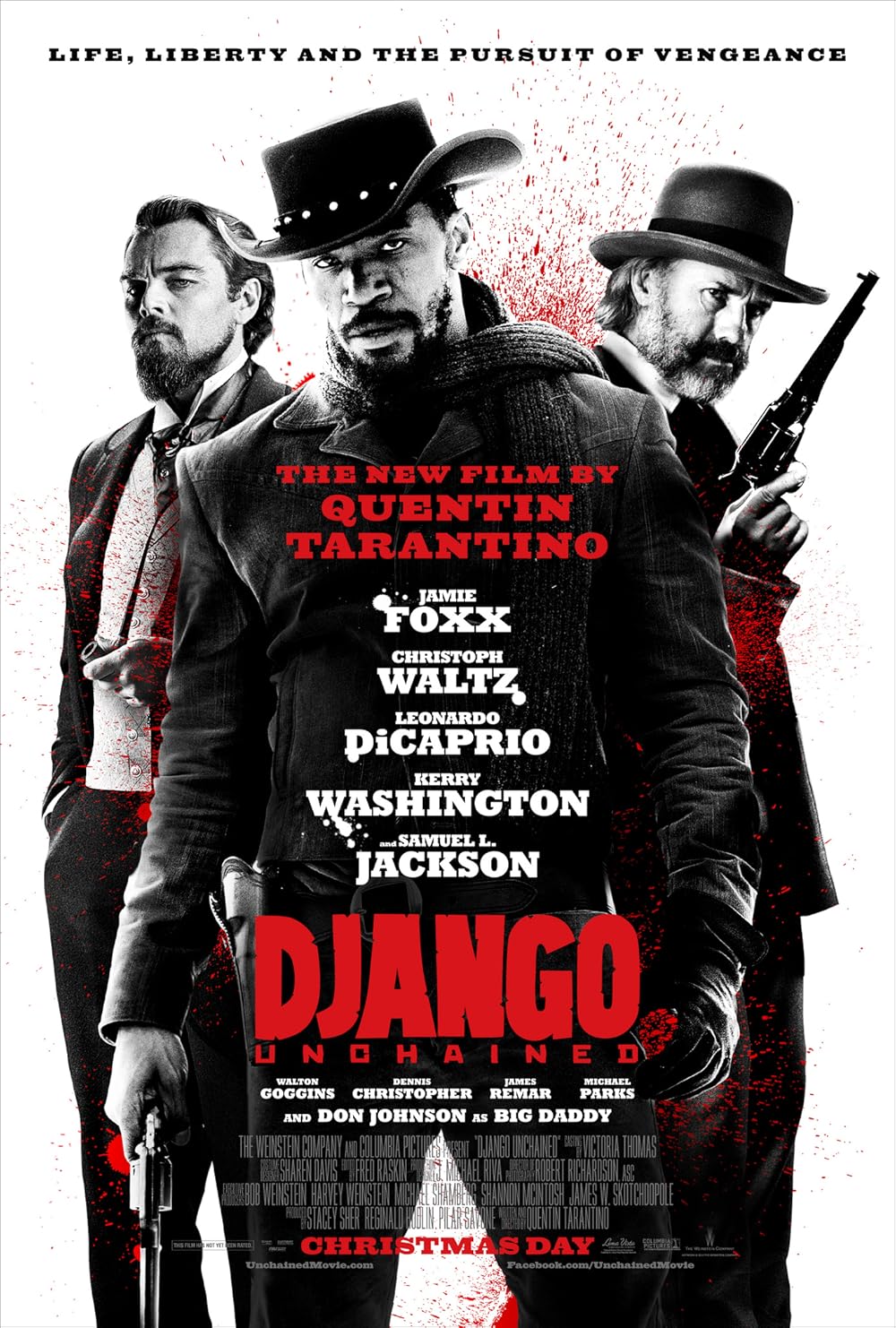


Django Unchained exploded into theaters on December 25, 2012, delivering Quentin Tarantino's audacious take on American slavery through the lens of spaghetti western revenge fantasy. This 2-hour and 45-minute western/drama category masterpiece combines Tarantino's signature stylized violence with unflinching examination of America's darkest institution, creating provocative cinema that sparked intense cultural conversations.
With an exceptional 8.5/10 IMDb rating from over 1.6 million votes, watch Django Unchained to experience the film that proved controversial subject matter could be addressed through genre filmmaking while maintaining both entertainment value and historical consciousness.
The Django Unchained cast delivers career-defining performances that balance Tarantino's stylized dialogue with genuine emotional depth. Jamie Foxx leads as Django Freeman, a freed slave turned bounty hunter seeking to rescue his wife from brutal plantation owners. Foxx's transformation from powerless slave to confident gunslinger provides the film's emotional arc across the 165-minute runtime.
Furthermore, cast of Django Unchained includes Christoph Waltz's Oscar-winning performance as Dr. King Schultz, the German dentist-turned-bounty hunter who frees Django and becomes his mentor. Waltz brings sophisticated charm and moral clarity to a character navigating America's morally bankrupt slave society. Leonardo DiCaprio delivers terrifying work as Calvin Candie, the sadistic plantation owner, while Samuel L. Jackson creates one of cinema's most disturbing villains as Stephen, the house slave who wields power through collaboration with white supremacy.
Jamie Foxx Django Unchained preparation involved studying both spaghetti westerns and slave narratives to authentically portray Django's journey from victim to hero. The actor's ability to convey dignity even in degradation, then confidence as Django gains power, demonstrates nuanced character work throughout the substantial runtime.
Additionally, Foxx's chemistry with Christoph Waltz drives the film's first half, establishing the partnership that enables Django's transformation. Their relationship—built on mutual respect despite vast cultural differences—provides the story's moral center.
Who directed Django Unchained? Quentin Tarantino crafted his most controversial and politically engaged film, using the western genre to examine slavery's brutality without sugar-coating historical reality. The director's signature techniques—chapters structure, anachronistic music, explosive violence—serve the larger purpose of making audiences confront America's original sin.
Furthermore, Tarantino's script balances horrific violence depicting slavery's reality with empowering revenge fantasy as Django turns the tables on his oppressors. This controversial approach sparked debates about whether entertainment can appropriately address historical trauma, with passionate arguments on both sides.
The director's love of spaghetti westerns—particularly the original Django (1966)—combines with serious engagement with slavery's history. This fusion creates unique viewing experience that honors genre conventions while subverting them for social commentary.
Movie Details:
What is Django Unchained about extends beyond simple revenge narrative. The film examines how slavery dehumanized both enslaved people and enslavers, showing how the institution corrupted American society at every level. Django's journey from slave to bounty hunter to rescuer represents reclaiming agency stolen by slavery.
Furthermore, the movie explores different responses to oppression—Django's violent resistance, Schultz's moral opposition, Stephen's complicity, and Broomhilda's survival. These varied approaches demonstrate slavery's complex psychology and the different strategies people employed to navigate or resist the system.
The story follows Django and Schultz's partnership hunting wanted criminals while searching for Django's wife Broomhilda, sold to Mississippi plantation owner Calvin Candie. Their mission requires infiltrating Candie's plantation, "Candyland," leading to the film's explosive final act.
Is Django Unchained based on a true story? The narrative is fictional, though is Django Unchained a true story in depicting slavery's brutality? The film's graphic violence reflects historical reality rather than exaggeration. Tarantino researched slave narratives, historical accounts, and academic sources to ensure accuracy in depicting the institution's horrors.
Furthermore, while Django himself is fictional, the character represents the historical reality of armed Black resistance to slavery. The film acknowledges that many enslaved people fought back violently when opportunities arose, challenging the myth of passive acceptance.
The film's 1858 setting—two years before the Civil War—captures the plantation system at its peak. The depicted violence, sexual abuse, and mandingo fighting (while debated by historians) reflect documented realities of slavery's worst excesses.
Leonardo DiCaprio Django Unchained performance as Calvin Candie creates one of cinema's most disturbing villains. The actor portrays the plantation owner's combination of refined manners and savage cruelty with chilling effectiveness. His famous "skull speech" pseudoscientifically justifying slavery demonstrates how educated people rationalized the institution.
Moreover, Django Unchained Calvin Candie represents the intellectual bankruptcy of white supremacy. DiCaprio's performance shows how thin the veneer of civilization coating plantation society actually was, revealing brutal savagery beneath elegant facade.
Samuel L. Jackson Django Unchained role as Stephen provides the film's most complex and controversial character. The elderly house slave wields enormous power through his relationship with Candie, using his position to brutalize fellow enslaved people. Jackson's performance demonstrates how slavery could corrupt even its victims.
Furthermore, Stephen represents the "Uncle Tom" archetype taken to its logical extreme—someone so invested in the system that he actively perpetuates it. The character forces audiences to confront uncomfortable truths about collaboration and survival under oppression.
Where to watch Django Unchained has varied over the years across different streaming platforms. Premium IPTV services provide high-definition viewing that showcases Robert Richardson's stunning cinematography and the film's detailed period production design throughout the 165-minute runtime.
Where can I watch Django Unchained with optimal quality? Modern 4K restorations reveal the intricate costume work and the beautiful landscapes contrasting sharply with the narrative's brutality. The enhanced viewing includes behind-the-scenes documentaries exploring the controversial production and Tarantino's research process.
Available Viewing Formats:
How long is Django Unchained at 2 hours and 45 minutes allows Tarantino to fully develop Django's transformation and explore the various plantation society dynamics. The runtime enables the film to balance action set pieces with character development and social commentary.
Furthermore, how long is the movie Django Unchained feels perfectly calibrated for the story's scope, with the first act establishing Django and Schultz's partnership, the second act infiltrating Candyland, and the final act delivering explosive revenge. The film's chapter structure breaks the substantial runtime into digestible segments.
How long is the film Django Unchained at 165 minutes allows Tarantino to explore historical details and character relationships that shorter films sacrifice. The length rewards patient viewers with deeply developed antagonists and supporting characters.
The film's frequent use of racial slurs sparked intense debate. Tarantino defended the language as historically accurate, arguing that sanitizing slavery's vocabulary would dishonor those who suffered under it. Critics countered that the word's repetition—over 100 times—exceeded historical necessity.
This controversy highlights the central tension in Django Unchained: can entertainment appropriately depict historical atrocity? The debate continues, with valid arguments on multiple sides of this complex question.
Christoph Waltz Django Unchained role as Dr. King Schultz earned the actor his second Academy Award for a Tarantino film. His portrayal of the cultured European horrified by American slavery provides moral compass for the narrative. Waltz's delivery of Tarantino's elaborate dialogue makes 19th-century formality feel natural.
Moreover, Schultz's character arc—from pragmatic bounty hunter to man unable to shake hands with a slaver—demonstrates how witnessing slavery's reality could radicalize even those not directly oppressed by it.
When does Django Unchained take place in 1858, two years before the Civil War, captures the antebellum South at its most brutal and economically powerful moment. This timing allows Tarantino to show slavery at its peak while foreshadowing the system's coming destruction.
Furthermore, the 1858 setting places the story after the Dred Scott decision but before John Brown's raid—a moment when slavery seemed permanent to many Americans despite growing abolitionist movement.
Where was Django Unchained filmed spans multiple locations recreating the antebellum South. Where was the movie Django Unchained filmed primarily in Louisiana, California, and Wyoming, with each location providing distinct visual character. The production used actual plantations (including Louisiana's Evergreen Plantation) to capture authentic period architecture.
Additionally, where is Django Unchained filmed for the snow sequences used Wyoming's wilderness, creating visually striking contrast with the later plantation settings.
The film's depiction of mandingo fighting—forced gladiatorial combat between enslaved men—sparked historical debate. Many historians argue no evidence supports widespread organized fighting of this type, suggesting Tarantino invented or exaggerated this practice for dramatic effect.
This controversy exemplifies broader questions about the film: when does dramatic license become historical distortion? The debate remains unresolved, with defenders noting the film's overall accuracy regarding slavery's brutality.
Walton Goggins Django Unchained performance as Billy Crash demonstrates the actor's range. His portrayal of Candie's brutal enforcer creates a villain whose sadism serves the plantation system. Django Unchained Walton Goggins role showcases the casual violence underlying slavery's "civilized" facade.
Django Unchained soundtrack famously mixes period-appropriate music with modern hip-hop and R&B, creating jarring anachronisms that serve thematic purposes. The modern music suggests slavery's legacy continues affecting contemporary America, refusing to let audiences treat the story as safely historical.
Furthermore, the eclectic soundtrack—featuring everything from Rick Ross to Ennio Morricone—demonstrates Tarantino's signature approach to film music as emotional punctuation rather than period authenticity.
Don Johnson Django Unchained role as Big Daddy, an early plantation owner Django encounters, provides darkly comic relief while showing slavery's ubiquity. Don Johnson in Django Unchained demonstrates how the institution pervaded Southern society at every economic level.
Django Unchained 2 remains pure speculation, with Tarantino showing no interest in direct sequels to his films. However, the director has suggested Django could appear in other projects, as he considers some of his characters to exist in a shared universe.
The film earned widespread critical acclaim while sparking intense cultural debate. Tarantino's screenplay won the Academy Award, while Waltz earned Best Supporting Actor. The movie's commercial success—over $400 million worldwide—proved audiences would engage with difficult historical subject matter when packaged as genre entertainment.
Furthermore, the film influenced subsequent depictions of slavery in American cinema and television, with shows like "Underground" and films like "12 Years a Slave" following its commercial success in addressing this historical period.
The film's graphic violence serves dual purpose—genre entertainment and social commentary. Tarantino argues that depicting slavery's brutality honestly requires showing its physical reality. The final act's explosive revenge provides cathartic release from the preceding horror, though critics question whether catharsis is appropriate response to historical trauma.
Since release, Django Unchained has become cultural touchstone for debates about how to depict historical atrocity in popular media. The film demonstrated that mainstream audiences would engage with America's slavery history when presented through familiar genre frameworks.
Moreover, the movie's influence extends beyond cinema to ongoing conversations about historical memory, racial justice, and the ethics of revenge narratives in depicting oppression.
Django Unchained transcends its western/drama category to become essential cinema that demands engagement with both its artistry and its politics across the 165-minute runtime. The film's examination of slavery remains provocative and divisive, exactly as Tarantino intended.
Whether experiencing this masterpiece for the first time or revisiting its explosive confrontations, watch Django Unchained streaming through premium IPTV services ensures optimal viewing quality that honors both the spectacular cinematography and the performances that make this revenge western unforgettable.
The film's enduring power stems from its refusal to provide easy answers about depicting historical trauma. Through Django's journey from slave to free man to avenging hero, audiences confront uncomfortable questions about justice, revenge, and how we remember America's original sin.
Watch Django Unchained today and discover why it remains one of cinema's most discussed achievements—a film that uses genre conventions to force confrontation with history's darkest chapters.
(for customer service and support)
(for new customers)